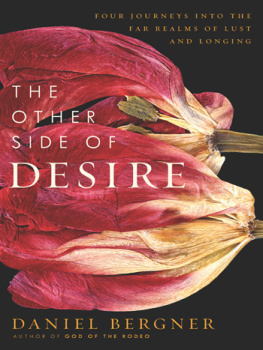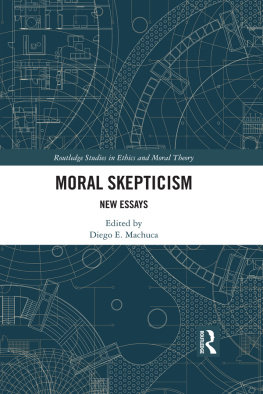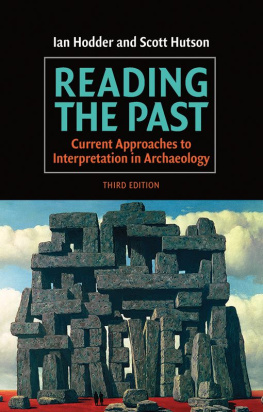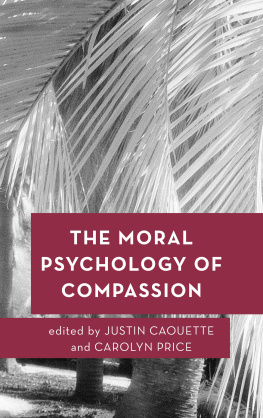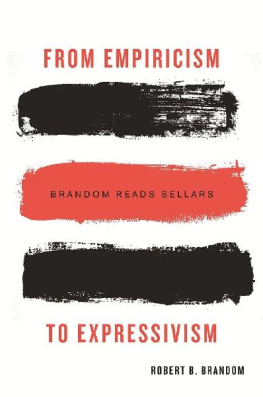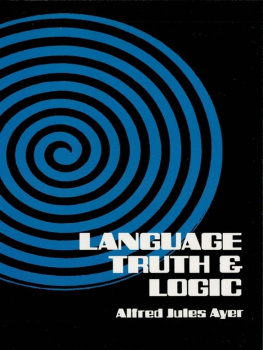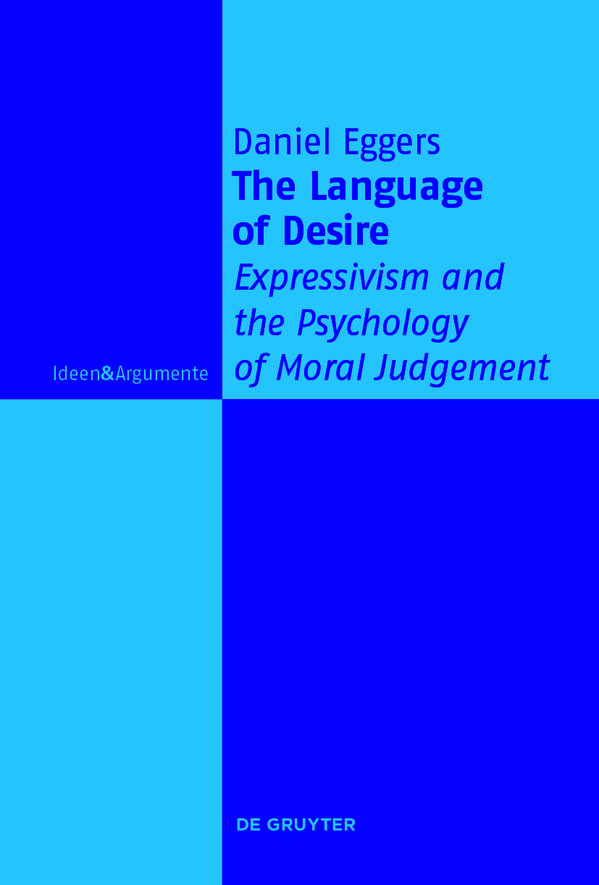Ideen & Argumente
Edited by
Wilfried Hinsch
Thomas Schmidt
ISBN 9783110738407
e-ISBN (PDF) 9783110733693
e-ISBN (EPUB) 9783110733747
Bibliographic information published by the Deutsche Nationalbibliothek
The Deutsche Nationalbibliothek lists this publication in the Deutsche Nationalbibliografie; detailed bibliographic data are available on the Internet at http://dnb.dnb.de.
2021 Walter de Gruyter GmbH, Berlin/Boston
Introduction
The metaethical theory commonly referred to as expressivism has dominated much of the metaethical debate of the past 30 years. According to the standard definition, expressivism is the view that moral terms and moral utterances express desire-like states of mind rather than beliefs. When Allan Gibbard and Simon Blackburn established the term expressivism for this metaethical view in the early 1990s, they took it to equally apply to Alfred Ayers and Charles Stevensons emotivism and Richard Hares prescriptivism as to their own versions of quasi-realism. Since then, many reformulations and advancements of the basic idea have been forwarded. At the same time, the term has come to be applied in a slightly broader fashion, having been used to also describe theories that depart some way from the standard definition. As a result, the metaethical landscape now contains destinations such as pure expressivism to name only a few.
While the expressivist theory in its various guises has received a huge amount of attention, there are some important issues which have been neglected and rarely addressed in a systematic fashion. One of those issues is the historical development of expressivism and the question of how exactly the views of the classic expressivists relate to one another. There is a consensus that the history of expressivism more narrowly construed begins with the publication of Ayers book Language, truth and logic in 1936, and there is also considerable agreement that Ayer, Stevenson, Hare, Blackburn and Gibbard are the key proponents and most influential endorsers of the expressivist idea. However, one striking fact about the previous debate is that the expressivist status of almost all these classic expressivists has been challenged. While scepticism may have been particularly prominent in the case of Richard Hare,
Where the status of modern proponents of hybrid expressivism or cognitivist expressivism such as Stephen Barker, Daniel Boisvert, David Copp or Terry Horgan and Mark Timmons is concerned, there is even less of an agreement to begin with. Thus, Michael Ridge classifies the approaches of Copp, Boisvert and Barker as cognitivist rather than expressivist, Given this surprising uncertainty as to who can count as a genuine expressivist and what makes a theory a true variant of expressivism, it seems valuable to revisit the question of what expressivism is really all about and to show what the approaches of the classic expressivists have in common and where and to what extent they differ from one another.
The only author whose status as an expressivist seems uncontroversial among metaethicists is Ayer. Yet, in his case, a further problem of the previous debate becomes pertinent. In the more recent discussion of expressivism, which is strongly influenced by Blackburns and Gibbards attempts to develop quasi-realist versions of expressivism that can do justice to the surface structure of moral discourse and the role of rational discussion and argument, Ayer is almost exclusively referenced as a cautionary tale, as an example for how not to be an expressivist. An analysis and discussion of Ayers views in their own right is hardly ever attempted any more, his theory being dismissed as notoriously crude even by fellow expressivists. As a result, important aspects and, in particular, important developments of his theory are not sufficiently appreciated. One example for the somewhat unsatisfactory approach to Ayers theory is that he is indiscriminately credited with a nave, causal interpretation of the expression relation, without any real attempt being made to back up this reading with robust textual evidence. To achieve a more balanced and charitable understanding of Ayers relevant position not only appears to be a demand of exegetical fairness. It can also contribute to a better understanding of the problems faced by alternative conceptions of the expression relation, such as the ones forwarded by Gibbard, Mark Schroeder, Michael Ridge or Peter Schulte.
A further issue that has not been given due attention in the past is whether expressivism is a conservative or a revisionary doctrine, which issue is linked to the question of how exactly expressivism relates to John Mackies error theory (or, for that matter, to modern derivatives of his theory, including variants of moral fictionalism). In the more recent literature, it is usually claimed that expressivism is a conservative, non-revisionary theory which is concerned with how we actually use moral language, not with how we ought to use it. What remains unclear, however, is whether this is meant to apply to all major forms of expressivism or only to the quasi-realist variants developed in the wake of Blackburn and Gibbard. Similarly, there is a routine distinction between expressivism and the error theory which draws upon the idea that, for Mackie, moral utterances express (false) beliefs rather than desire-like states of mind, which would render him a peculiar sort of metaethical non-naturalist. However, not only does Mackie himself abstain from characterizing his theory in these terms. The references in question often display certain inconsistencies that have not been taken up by commentators so far. As already indicated, expressivism is typically viewed as an alternative to, and contender of, the error theory, and Blackburn has placed much emphasis on the fact that expressivism is not itself a version of the error theory. At the same time, however, Blackburn explicitly refers to Mackie as an expressivist in his own right, and other writers have seen important affinities between the two approaches as well. Now one way of resolving these inconsistencies might be to attribute to Mackie a non-expressivist conception of moral language, but an expressivist conception of moral thought. Yet, it is by no means obvious that Mackie can be interpreted in this way, nor is it obvious whether the suggested combination presents a stable overall position.
The distinction between moral language and moral thought appealed to above already points to a final and more general problem of the previous debate. The more recent discussion of expressivism prompted by the writings of Blackburn and Gibbard has been accompanied by a growing discussion of issues in moral psychology to which not only social and developmental psychologists and neuroscientists such as Jonathan Haidt, Joshua Greene, Adina Roskies or Fiery Cushman have made their contributions but also numerous metaethicists. In virtue of these contributions, modern metaethics has experienced something akin to a psychological turn since the 1990s which has superseded the ontological turn initiated by Mackie and Gilbert Harman in the late 1970s, and it does not seem far-fetched to claim that this psychological turn has been facilitated, if not caused, by the increasing importance of the expressivist approach.
Yet, the question of how exactly the expressivist approach to moral language connects with issues in the philosophy of mind and the philosophy of action has rarely been addressed head-on. Many commentators just seem to take it for granted that expressivism has a psychological side to it or that it at least has certain psychological commitments in tow. and something similar may be true of Ayer, the Humean credentials of Gibbard and Hare are much more precarious. On the other hand, it might be for exactly this reason that some metaethicists have reservations against viewing Hare and Gibbard as full-fledged expressivists to begin with which would again suggest that there


